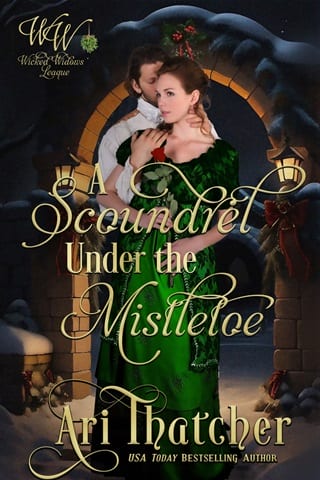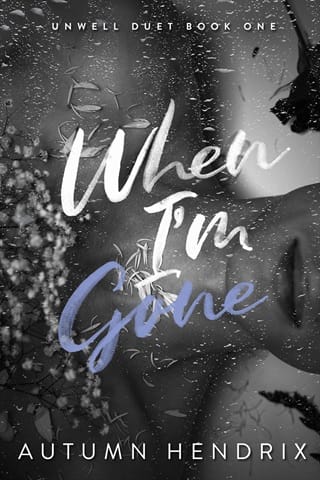Chapter 2
T he delicate clink of porcelain against wood broke the quiet of the drawing room as Joy placed the teacups on the table while Mr. Russell hung up his coat and scarf. A hint of bergamot scented the room, and she felt an inexplicable stir within her—a fluttering notion that bordered on audacious. Did she have the nerve?
She forced herself to speak before sensibility took control of her. "Would you consider sketching me, Mr. Russell?" Her heart seemed to skip a beat, waiting for him to cast aside her request as frivolous.
Mr. Russell paused, mid-sip, his blue eyes lifting from the dark liquid to meet her gaze. For a moment, he simply observed her, his gaze analytical yet distant, as if he were seeing her not just with his eyes but with a painter's mind. The silence stretched between them, and Joy felt the weight of his gaze as though it were tangible, a sculptor assessing the clay before him.
"Sketch you, Mrs. Sinclair?" He sounded almost bemused, the words measured and slow as if testing their shape in the world. A muscle twitched in his jaw, the only sign of surprise in his otherwise composed demeanor.
"Yes," she replied, her own boldness surprising her. There was a certain freedom, she found, in the wake of widowhood—the shackles of one's former life loosening enough to allow small acts of rebellion. "We seem to have some time on our hands this afternoon…"
"Very well," he said after a thoughtful pause. "After I finish my tea."
Joy took the chair opposite him at the table and pretended to sip her drink, too nervous to actually consume anything.
Time stretched immensely before he finally straightened from his slouched position, setting down his cup with a clink that seemed to resonate through the room. Pushing back his chair, he rose and went to the room Joy had explored.
A smile flickered across Joy's lips, a bloom of pleasure unfurling within her chest. She had dared greatly, and he had accepted the challenge.
Her heart skittered like a startled hare as Mr. Russell rummaged through his satchel, producing pencils and papers with the care of an alchemist selecting potions. Her eyes followed him, watching to see if he picked up that leather-bound sketchbook. Instead, he returned with his easel and a paper pinned to a thin board.
"Where should I sit?" she asked.
"Here," he directed, pointing to a chaise longue beside the window where the afternoon sun filtered through lace curtains. The thin light pooled around the chosen spot, illuminating it in the dim room.
As she settled onto the plush fabric, a chill washed over her, the fire being too far to warm the cold from outside. But a fresh wave of heat crept up her neck as she contemplated the possibility of disrobing for a strange man. Her husband was the only man to have ever seen her nude, and even then, only when he caught her bathing.
Mr. Russell would ask her to undress, wouldn't he? All the women she'd seen in his book were naked, or draped with an artfully-placed bit of lace. The thought sent a thrill down her spine, yet she dared not voice the question that danced on her tongue. Instead, she imagined the scenario in vivid detail, the cool draft from the window playing across her exposed skin, hardening her nipples. A strange man's gaze mapping her every inch, capturing her essence without a single touch.
"Turn your head slightly... there," Mr. Russell instructed, stepping back to survey her position. "And think of something pleasant. It will soften your features."
"Something pleasant," Joy echoed softly, allowing her mind to wander. He was beginning, she realized. He would draw her fully clothed. She sighed, then thought of wildflower meadows, of laughter shared with a friend, of the unexpected sweetness found within the pages of a beloved book. Her muscles softened as she sank back slightly into the chair, a whisper of a smile gracing her lips.
"Perfect, stay just like that," he said, his words carrying an undertone of admiration that caused her to blush anew. His eyes met hers for a brief moment before dropping to the paper before him.
She watched, fascinated by the rhythm of his hand as he sketched, conveying not words but shapes and shadows onto the blank canvas. She longed to be able to watch what he drew, as silly as that sounded.
"Relax, Mrs. Sinclair," he said without looking up. "You're safe here."
His reassurance, simple and steady, anchored her. And yet a shiver of unbidden disappointment feathered through her as he moved his pencil above the page without requesting her to shed even a layer of her attire. Her grey gown was a pretty enough garment with its fine lace trim, yet it clung to her form with a sturdiness that now seemed almost prudish. With a gentle rustling of fabric, she shifted slightly in her seat.
"Please, remain still." His tone was a touch firmer now, a polite reprimand against her unintended movement. He had not lifted his gaze to meet hers, instead, his focus remained tethered to the paper, as if he could coax her essence onto the sheet with sheer will.
A silent sigh escaped her lips, as she chided herself for even imagining he might wish her to pose nude. To offer to undress would mean to confess—to reveal her clandestine perusal of his sketchbook and the unadorned figures that posed within its pages. It was a truth she could not afford to bare, not when staying alone with him risked a scandal that could ruin a lady's reputation. Exactly the sort of scandal that would lose her governess position.
The scratching of pencil on paper filled the space like a metronome, steady and sure. Joy held her breath, caught in a folly of her own making. She wished to be seen, truly seen, but the layers of lace and linen felt like a wall between her secret self and this man—this artist—who wielded his pencil as a knight might brandish a sword.
In the quiet, her heart thrummed a rhythm of anticipation mingled with doubt. The notion that her visage could stir this man's inspiration seemed as far-fetched as a pauper's dream of riches. What did she have to offer but the ordinary countenance of a widow whose beauty—if ever it had been noteworthy—was surely fading like the last hues of twilight? She was thirty-four years old now, not an innocent ingenue.
Yet there she sat, a living still life under the scrutinous eye of a man who saw the world in shades and lines. Joy pondered the memory of her reflection in the mirror that morning. She was of average height, wore her reddish-brown hair arranged in simple fashion, and had plain brown eyes that seldom betrayed emotion since the death of her husband. These were not the sort of features sung about in sonnets or captured in grand portraits. And yet, here she was, the subject of Mr. Russell's focused attention, the center of a world reduced to pencil strokes and the silent language of art.
How strange to feel so invisible and yet so painfully visible all at once.
With a final flourish, Mr. Russell set his pencil down and exhaled deeply, as if he had been holding his breath. Joy watched, her pulse quickening, as he turned the easel around for her to see. There she was, immortalized upon the page, her features brought to life with gentle strokes and soft shadows.
She gazed at the image, her breath catching in her throat. The woman on the paper radiated a quiet confidence, her eyes alight with an inner fire she seldom allowed herself to acknowledge. "I look... different. Prettier," she said.
"More than pretty," Mr. Russell corrected with a firmness that brooked no argument. "You are captivating, Joy. It's there in the tilt of your chin, the depth in your brown eyes, the subtle strength in your posture. It's not the superficial allure, it's the resilience etched into your very being."
Joy felt a warmth blossom in her chest. His words were a balm to the scars left by years of indifference. Her late husband, though not unkind, had rarely spoken words of admiration, and when he did, they felt perfunctory—like lines recited from an obligatory script rather than sentiments borne of genuine affection.
For a fleeting moment, as she met the artist's earnest gaze, Joy allowed herself to imagine a different kind of life—one where her partner saw her not as a duty but as a source of wonder. What would it be like to wake each day to the gaze of someone who appreciated her, who marveled at her existence as Mr. Russell seemed to with his art?
"Thank you," she said softly, the words inadequate to express the tumult of emotions his praise had stirred within her. She clung to the vision in the sketch—a version of herself that might one day step off the page and into a world where she could be loved for all she truly was.
Joy's gaze traced the lines of her sketched likeness. The room was quiet now, the air hanging heavy with the awkwardness of strangers forced in close proximity. She stood, smoothing the fabric of her modest gown, and approached the window where the snow lay piled high.
How different this world was from the one she had known—a world where duty and propriety were as much a part of her as the breath in her lungs. The furnishings in the room where she stood would have suited her home, but something about the place made her think spontaneity would be allowed, as would dreams of feeling fulfilled.
She'd know fulfillment soon enough, she reminded herself. She was no longer simply the widow left behind by a stoic husband, she was a woman reborn in the service of Lord and Lady Peasemore. Her employment there was more than mere happenstance, it was a lifeline, a promise of security and independence long yearned for.
With every clink of coin she would add to her reticule in the coming years, Joy would forge a future of her own making. Each shilling saved was a step towards an existence where she would answer to no one but herself. She imagined a humble cottage, perhaps near the sea, where she could watch the waves greet the shore each morning, her life measured by tides rather than the demands of others.
"Twelve years... perhaps more," she whispered. "Time enough to prepare, to save, to dream."
As the children of the Peasemore household grew, so too would her cache, until the day when their laughter no longer echoed through their home and her presence as governess became a memory fondly recalled. It was a comforting thought, a beacon guiding her through the uncertainty she'd felt in the past year.
She was a fortunate woman, she reaffirmed, a smile gracing her lips as she turned back from the window. "Thank you, Mr. Russell," she said, though he was in his studio shuffling things about. "For showing me a glimpse of what might be, and reminding me of what will be."
 Fullepub
Fullepub 



